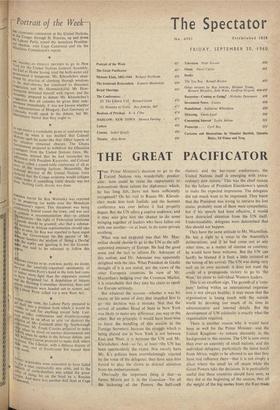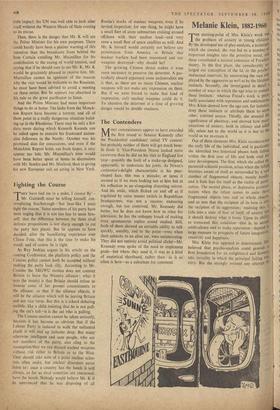THE GREAT PACIFICATOR
Pr HE Prime Minister's decision to go to the I United Nations was wonderfully predict- able: hOw could he resist the opportunity to demonstrate those talents for diplomacy which, he has long felt, . have not been sufficiently recognised? On his visit to Russia Mr. Khrush- chev made him look foolish; and the Summit conference was over before it had properly begun. But the UN offers p. captive audience; and it may also give him the chance to do' some bringing together of leaders who have fallen out with one another—or at least, to do some private soothing.
What was not expected was that Mr. Mac- millan should choose to go to the UN as the self- appointed emissary of Europe. He had the good sense and the tact to inform Dr. Adenauer of this notion; and Dr. Adenauer was apparently delighted with the idea. What President de Gaulle thought of it is not stated; nor the views of the other European countries. In view of Mt. Macmillan's hedging over the Common Market, it is improbable that they take his claim to speak for Europe seriously.
But whatever the reasons—whether it was his vanity or his sense of duty that impelled him to go--the decision was a mistake. Not that the arrival of another Head of State in New York was likely to make any difference, one way or the other. But on principle, it would have been wise to leave the handling of this session to the Foreign Secretary; because the struggle which is being played out in New York is not between East and West; it is between the UN and Mr. Khrushchev. And—so far, at least—the UN has been spectacularly the victor. Not merely have Mr. K's policies been overwhelmingly rejected by the votes of the delegates; they have seen him forced to play the clown to distract attention from his embarrassment.
Obviously the important thing is that—as James Morris put it, in the Guardian—`for all the bickering of the Powers, the half-cock rhetoric and the bar-room conferences, the United Nations itself is emerging with extra- ordinary new stature.' This was the chief reason for the failure of President Eisenhower's speech to make the expected impression. The delegates did not much want to be impressed. They knew that the President was trying to retrieve his lost status; probably most of them were sympathetic; but if his speech had been effective, it would have distracted attention from the UN itself. Understandably, delegates were determined that this should not happen.
They have the same attitude to Mr. Macmillan. He has a right to a voice in the Assembly's deliberations; and if he had come out at any other time, as a matter of interest or courtesy, he would have been welcome. But the UN can hardly be blamed if it feels a little irritated at the timing of his arrival. The UN was doing very well on its own account; it does not want the credit of a propaganda victory to go to 'the West,' let alone to individual Western leaders.
This is an excellent sign. The growth of a 'com- pany' feeling within an international organisa- tion is not always healthy; it may mean that the organisation is losing touch with the outside world by devoting too much of its time to administrative and internal details. But the development of UN solidarity is exactly what the organisation required.
There is another reason why it would have been as well for the Prime Minister—and the United Kingdom—to remain discreetly in the background in this session. The UN is now more than ever an assembly of small nations; and the individual delegates, particularly the latest batch from Africa, ought to be allowed to see that they have real influence there—that it is not simply a place where the small let off steam while the Great Powers take the decisions. It is particularly useful that these countries should have seen, as they did at the beginning of the session, that all the weight of the big names from the East made
little impact; the UN was well able to look after itself without the Western Heads of State coming to its rescue. Then, there is the danger that Mr. K will use the Prime Minister for his own purposes. There could hardly have been a plainer warning of this intention than the broadcasts from behind the Iron Curtain extolling Mr. Macmillan for his contribution to the easing of world tension, and saying that if he should care to see Mr. K, Mr. K would be graciously pleased to receive him. Mr. Macmillan cannot be ignorant of the reasons why the visit would be welcome to the Russians; he must have been advised to avoid a meeting on these terms. But he appears too absorbed in his role as the great pacificator to listen. And the Prime Minister had more 'important things to do at home. The leaks from the Monck- ton Report have become a torrent; and all of them point to a really dangerous situation build- ing up in the Rhodesias. There may be only a few days more during which Kenneth Kaunda can be relied upon to restrain his frustrated nation- alist followers in the North: October was his promised date for concessions, and even if the Monckton Report holds out fresh hopes, it may appear too late. Mr. Macmillan's time would have been better spent at home in discussions with Mr. Sandys and Mr. Macleod, than in giving his new European suit an airing in New York.











































 Previous page
Previous page